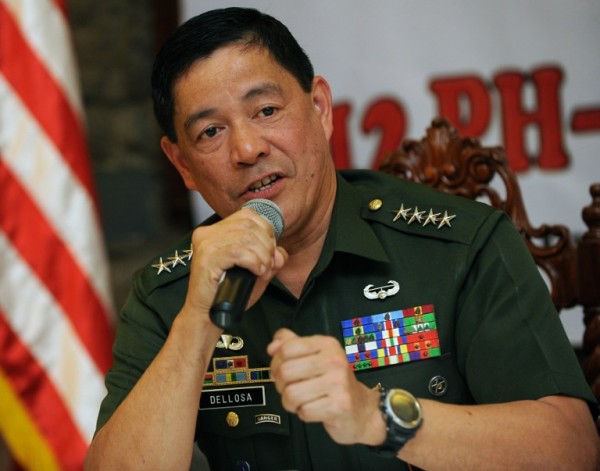‘Fact of life’ at BOC: Weekly ‘tara’ or bribe
The payment of “tara,” or grease money, by smugglers and other unscrupulous port users to corrupt Bureau of Customs (BOC) personnel has become a “fact of life,” making the illegal practice “embedded in the culture” of the Department of Finance-attached agency, the head of the BOC Intelligence Group said in a report to President Aquino.
In the report, a copy of which was furnished the Inquirer by a Malacañang source, Deputy Customs Commissioner Jessie Dellosa did not say the total tara collected weekly by the BOC.
But the former Armed Forces of the Philippines chief of staff said the acceptance of tara had been “countenancing tolerable levels of smuggling (at the ports) with the bureau’s operational limitations.”
Institutionalized graft
“The weekly tara, a sum of (mainly cash) collections from consignees (of imported shipments) and brokers, allocated and accepted by some BOC officials and employees in consideration of less-than-thorough examinations (of imported goods), undervaluation or complete exemption from physical and other means of customs inspection, has become the bureau’s institutionalized source of work-related expenses,” Dellosa said.
Article continues after this advertisementThese include the BOC’s “operational requirements” like travel, petroleum, oil and lubricants (POL), as well as telecommunications expenses.
Article continues after this advertisement“This anomaly has ingrained within the bureau a culture of indebtedness to players, smugglers, brokers and other clients, resulting [in] institutionalized arrangements of graft and corruption,” he said.
According to Dellosa, the collection of tara has also “emerged as a more attractive and convenient motivational incentive for frontline customs personnel.”
“Other factors such as low salaries and lack of benefits like housing; the primacy of patronage in promotions and positioning vis-a-vis the remuneration quotas to recommending authorities; and the lack of legal support from the bureau for work-related-cases, all these conspire to weaken the morale and the moral fiber of personnel and make them vulnerable to the temptations of unscrupulous groups and individuals,” he told the President.
In his report, Dellosa lamented that “vigor and enthusiasm for strict enforcement of customs laws are also undermined by present policies that allow smugglers to redeem seized and forfeited shipments with minimal penalties involved.”
“Under this scheme, smugglers have more to gain than to lose, especially with the inclination of the (collection) districts to consent to settlements for sure revenues rather than have the forfeited shipments exposed to pilferage in warehouses then auctioned off, which more often than not result in very low bid prices,” he said.
Thus, “the biggest irony is that the revenue collection mission of the bureau in fact fuels the tacit approval of technical smuggling,” he said.
“Instead of compelling importers and brokers to pay the correct customs duties and taxes, some collection districts exercise discretionary valuation, benchmarking and other forms of undervaluation, toleration of misclassification, all driven by the desire to gain the brokers’ loyalty and continued patronage, increase importation traffic and revenues in order to meet collection targets.”
Dellosa said “the tara issue cannot be addressed from within the BOC only as the importers and brokers also benefit from the perpetuation of the illegal practice.”
“As willing victims in many instances, their attempts to misdeclare, misclassify or undervalue importation provide the opening for unscrupulous customs personnel to exploit the defects of their shipments.”
Looking the other way
In what he referred to as “all-in-package” practice, Dellosa said “brokers induce their consignees to shell out P140,000 and P120,000 for every 40-foot and 20-foot container, respectively, as the supposed package deal includes the P15,000-tara for BOC agents. This all-in package earns for the broker a brokerage fee of P14,000 per container as against the legal fee of P5,300 per container.
“To the brokers and consignees, the tara is rationalized as just another component of business expenses, a cost of doing business that is part of the additional overhead. To corrupt customs personnel, accepting tara in exchange for loose procedures or looking the other way is jadedly rationalized as trade facilitation,” he said.
“As the tara is spread to as many recipients as possible, its twin aim is to gain the cooperation, loyalty or silence of the beneficiaries on one hand, and to discredit the unfriendly or marginalize those who espouse a counter-culture on the other,” he added.
Increase salary
Without referring to the tara, Customs Commissioner Alberto Lina has vowed to “clean customs houses and rid ourselves of crooks in the service.”
When interviewed, Lina disclosed that he would “push for an increase in the salaries of customs personnel.”
“If that happens, then we’re in a better position to diminish, if not totally eliminate corruption in the bureau…. I know we cannot do it overnight, but I strongly believe by increasing the take-home pay of our employees, corrupt practices in the bureau could be stopped,” he told the Inquirer.
According to Lina, he had already consulted and discussed the matter with several members of Congress to consider his proposal.
At a recent speaking engagement, the BOC head said the bureau was also exploring the possibility of “adopting transaction fees as followed by customs services in Singapore and the United States, among other countries.”
“These, however, need legislation. But we hope these will be considered in the ongoing deliberations on the proposed Customs and Tariff Modernization Act in Congress,” Lina added.
RELATED STORIES
‘Tara’ continues at customs bureau
